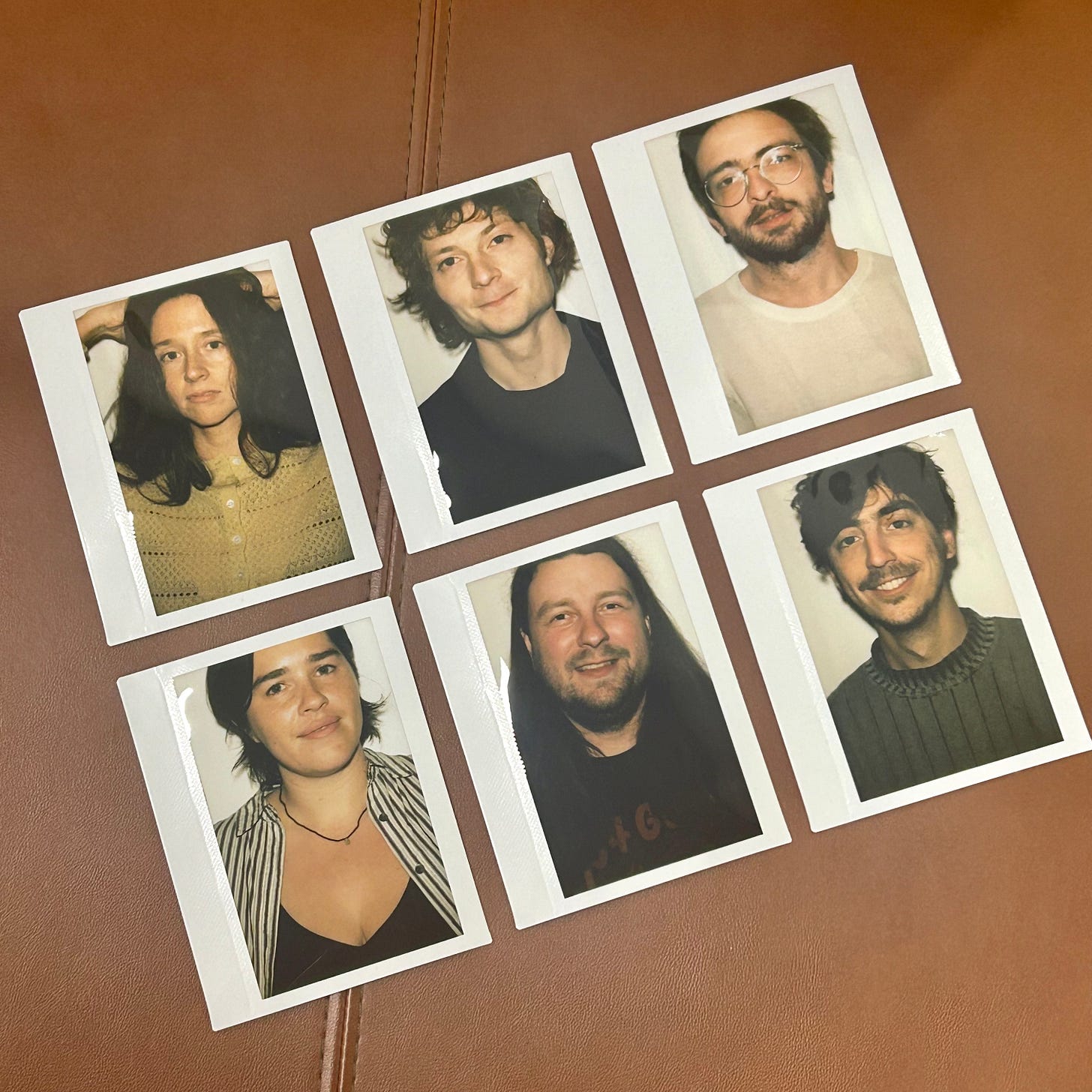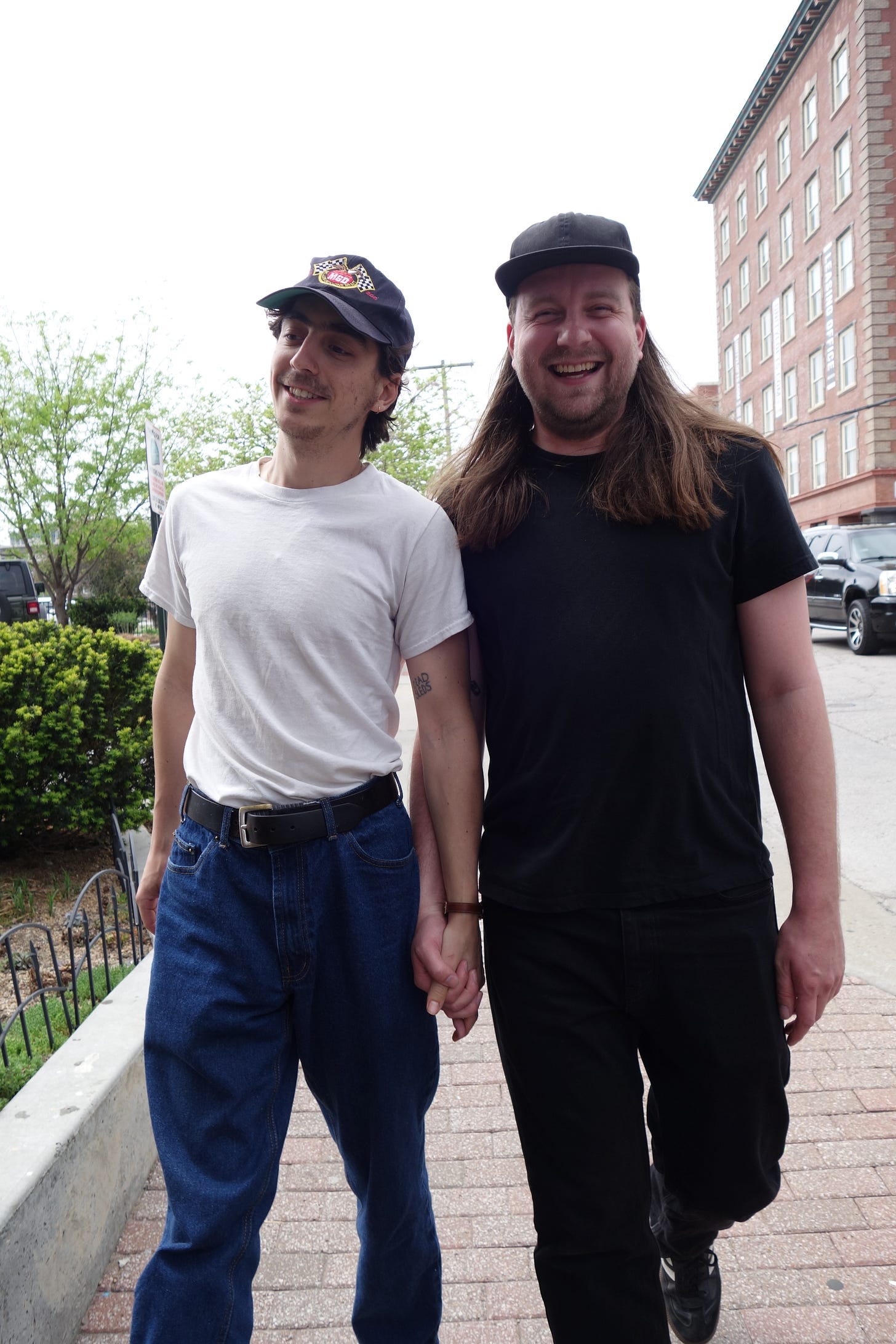Macon Light
How your guitar solo saves lives
Here I am in a Macon, Georgia, strip mall parking lot, consuming a sunset while the suburban gentry finish dining at their Waffle House or local Italian joint of choice.
The power lines look poetic again because it’s almost summer. And the Georgia heat feels cool because I haven’t felt enough of it to be burdened yet.
I saw a woman returning her cart to the grocery store corral offer to take another woman’s cart with her, and she gratefully accepted. Ope, there it is. Tiny ant, rippling the water with kindness. Three smiles: hers, hers, and mine.
The Waxahatchee Tigers Blood band and crew has been on the road for two weeks. We’re enjoying each other so much. The shows have been filled with audiences who seem hungry to hear Katie’s voice and to whoo some support for her new album, Tigers Blood. Katie’s voice! And songwriting! That’s what we’re out here for. The bus rolls every night and it rolls because Katie is so dedicated to singing and writing. We’re following her lead.
We’re playing some historic venues: Massey Hall in Toronto, The Ryman in Nashville, Cain’s Ballroom in Tulsa. Wednesday night, Lucinda Williams and Wynonna Judd joined us for “Abandoned” and “Love Is Alive,” respectively. Pinching ourselves, jeeze louise, we’re so lucky to do this.
Say, that reminds me. On any given night on the road or playing at home, a show for me (and many musicians) is a mental rollercoaster between peaks of flow (no thoughts at all) and conscious troughs of “oh, my god, we’re so lucky to do this” (or, alternately, “oh, my god, I’m so good at this”). Then, the tracks stop altogether. The cart has to fly over a viper pit of bad responses to the recognition of good fortune.
The snakes in the pit sound immediately silly when named out loud, yet they’re there and I think about them every night (though thankfully not all night): I just messed up the tempo, we’re selfish to play music, someone else should have the opportunity I have, or someone in the audience is going to hate us for loving ourselves.
The way I’ve found to keep the coaster cart going with enough momentum to fly over the stupid viper pit is to remember that we’re not directly hurting anyone by playing music (even in a professional, electrified setting) and that, actually, the best thing you can do for everyone in a moment like that is to kick ass, own it, let your soul fly, to feel and do nothing else.
After our show in Nashville show I met my good friends W and C at one of the hectic, ear-splitting bars on Broadway Street to hear C’s bandmate play country covers.
The band was shit-hot, every member killing on their instrument. I’ve known the harmonica player, Miles, for a few years, and he sounds like someone twice his age who might’ve played with the Nashville A Team. The guitarist was new to me and he was blowing my mind with his Waylon licks and Tele mastery. A lot of the modern country requests they played aren’t my cup of tea, but the point is that that wasn’t the point. They were just so good and they were doing something with beautiful, hardly respected mastery.
Afterward, W wondered aloud why we don’t hear bands like that in Chicago or in the North as often. That is, musicians who play loud, fast, upbeat, and unapologetically.
He wondered if maybe some people where I’m from have gotten the impression that in order to be a good person, an adequate ally to vulnerable people, you have to diminish yourself. And whether that has carried over into music: performers feeling like, in order to be beloved by an audience, they need to be self-effacing, deferential, and not show-offy.
Those are big thoughts about macro patterns to chew on. I can always count on W for that. He’s a folk philosopher of the finest kind. Which is to say he’s a construction worker, he’s extremely smart, he spends his days doing things with and for other people, listening to old men in bars, challenging fucked-up ideas, and ultimately building floors that you can stand on without falling.
My own suspicion is that people who are going to be confident on stage are insuppressibly confident, and those who doubt themselves do so whether or not there are cultural currents to misapply. (Think of Prince. Nothing was going to stop that person from being himself in public. And there are countless others who are unstoppable with less extreme plumage.)
Confidence is also malleable. Performers who feel sheepish overcome it with practice. In my own life, singing on the Tweedy Show nearly every night helped me grow from a scared singer into a mostly confident and free one. Even though I’ve played drums in public since I was seven, I always felt a little afraid to sing, and now, because of repeat exposure, it feels normal and good.
But I guess W’s point is that some people are preventing themselves from growing more confident because they have this culturally absorbed feeling that it’s wrong to step out there. That it’s morally better or at least socially expedient to make sure their stance isn’t too wide and their stage presence remains self-conscious.
If this misunderstanding exists, it’s not propagated by the true leaders of social justice movements. The message they send is one of universal dignity and fulfillment. Indeed, the slogan says: no one is free until we’re all free. Exclusionary outliers aside, the whole point of “the work” is to have a world that’s populated by full, fulfilled people.
Instead, it would be a misunderstanding that has cropped up due to the tornado clash of race education with fragility and guilt, without enough resolution in the conversation for people to understand what movement leaders mean in the first place.
You can see where the disconnect takes root. Sometimes, there are finite supplies of things to distribute. Like, time to speak in a classroom. Or board positions at a company. Or entrées to lucrative business deals, or a million other ways people build power and keep it. Since the murder of Michael Brown in 2014, millions of people have been drawn to consider how these finite opportunities are distributed based on race and class, and then some have mistakenly extended those considerations into a personal call to be superficially small.
The fundamental core of expression, the sense you have while you walk down the street, the empowered feeling you have while you’re doing things you love or spending time with people, those were never subject to the realities about scarcity that activists have described for us. About those things, they have a different message altogether, one that’s been forgotten or abused or papered over by fallout from the prior decade’s events.
The message I see from old-school Civil Rights leaders or from new-school internet culture leaders is: In order to help make the world better, you better bet your ass on fulfilling yourself. If you don’t, you’re going to be a drag. And you might end up taking it out on someone else. Hating yourself is not the same as loving another. And yet here we are, with some members of my generation behaving as though they think that.
An activist who hates themself is like a dry drunk. They have the appearance of health but none of the lessons or systems to build lastingly good relationships and to repair what’s damaged on the inside. I’ve found that conscientious people taking the “hate thyself to free others” tack, no matter how good their intentions are, tend to find an emotional release in other people. Their own needs aren’t met, and so while they’re out there expending energy on behalf of the oppressed, they’re coming back home to friends and family (or the internet) and taking out their dissatisfaction and lack of fulfillment on other members of the community.
There’s a difference between being meek on stage and hating oneself, to be sure. But I see a connection. We’re talking about self-imposed limits on your spirit and false modesty. We’re talking about the idea that it hurts anyone to play a guitar solo, when it doesn’t. And getting rid of the misleading notion that it helps someone else not to play a guitar solo.
I still don’t want to hear a tasteless wank that loses the plot of the music overall, severs itself from the other beating hearts on stage, and aggrandizes the player. And we should all, of course, still heed the call to focus on others and to examine our own selfishness.
I do want to hear the solo that sounds right in the whole, that rallies everybody into some ecstasy, that lets a player feel like, “I was just so Me, and it felt so good.” And now here we are together.




Spencer I believe that putting your music (and excellent writings) out there is an act of love for the world. Love is never lost.
What a gift to read. Beautifully written & thoughtful. Thank you, Spencer.